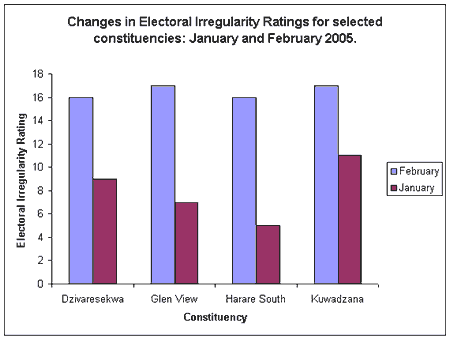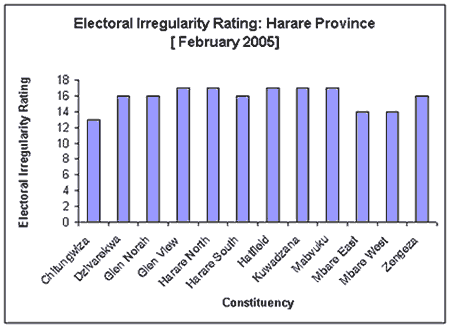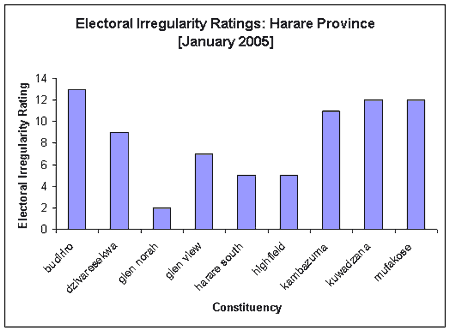| |
Back to Index
Election
Climate Report No. 2
National
Constitutional Assembly (NCA)
February
25, 2005
Download
this document
- Word
97 version (299KB)
- Acrobat
PDF version (170KB)
If you do not have the free Acrobat reader
on your computer, download it from the Adobe website by clicking
here.
The
Election Climate Reports are produced by the NCA in order to provide
information on the prevailing climate for citizen participation
in the forthcoming Parliamentary Election. The NCA has already communicated
its condemnation of the constitutional framework under which the
elections are being conducted. The Report is a consolidated statement
of the reports sent in by a national network of community monitors.
The
community reports sample a number of electoral "atmospherics"
(described below), which aim to provide a clear description of the
state of affairs prevailing in any one constituency:
- Freedom of
Association;
- Freedom of
Assembly;
- Freedom of
Movement;
- Freedom of
Expression;
- Incidence
of Political Violence;
- Disputes
over electoral procedures and electoral irregularities;
- Occurrence
of voter education;
- Use of food
as a political weapon.
The
reports sample 18 critical indicators and hence provide a simple
score for any one constituency, which we have termed the "Electoral
Irregularity" [EI] score: the higher the EI score, the worse
the electoral climate in a constituency.
Overview:
This
is report covers Harare province, including Chitungwiza.
Most of the constituencies covered here are in the high density
areas where, in the past, elections violence and intimation have
been high. The EI ratings were markedly high, with the lowest
in Mbare East with a rating of 11, and the average for the Province
being 16. All the indications were that basic freedoms were infringed
on in these constituencies, and this requires immediate attention
by the relevant authorities and civic organisations. This report
indicates that Harare does not currently have an environment suitable
for free elections. This report also indicates that there has been
marked shift for the worse since the political campaigning began
in earnest.
As is seen from
the detailed findings reported below, no constituency reported an
Electoral Irregularity Rating of less than 12, and, furthermore,
5 constituencies – Glen View, Harare North, Hatfield, Kuwadzana,
and Mabvuku, - shared the extremely high EI rating of 17.
The ratings show a worsening in all areas sampled: from basic freedoms
through to the political use of food, all indicators showing a worsening
in the electoral climate in Harare.
Evidence for
this worsening cameos from a small comparison of the changes over
time that was possible due to the collection of some data from the
ZanuPF primaries that were held in January. The data for the ZanuPf
primary elections came from a small pilot project, examining the
utility of the Electoral Irregularity rating scheme, and was included
here for purposes of comparing changes avoer time.These changes
are shown in Figure 1 (over), and, as can be seen, there has been
a decided shift for the worse since campaigning has seriously begun.
In all of the Harare constituencies sampled, there has been a worsening
of at least 5 rating points
The NCA calls
upon all concerned parties – government, the political parties,
and the civics concerned with peace building – to take immediate
steps to investigate these allegations, and to take firm steps to
correct all irregularities confirmed.

Harare
As
can be seen from the Figure below, all constituencies show very
high EI ratings, with interference with the basic freedoms, political
violence, electoral disagreements, and the political use of food
being reported. In addition, virtually no formal voter education
has taken place recently.
As regards interference
with freedom of association, ZanuPF supporters were reported as
being unable to wear their party insignia. This was reported in
Dzivarasweka, Kuwadzana, Glen Norah, Mbare West, Glen View, Harare
South, Hatfield and Zenzeza. Interestingly, in these same constituencies,
the MDC are reported to be unable to put up their posters as part
of their campaign process.
With regard
to interference with freedom of assembly, both main parties - Zanu
PF and MDC - were able to hold meetings, but Zanu were able to hold
more, averaging five meetings to MDC's three. This could be
attributed to the fact that POSA affects the MDC more significantly
than it does Zanu. However, all the monitors reported that the meetings
where attendance was forced were ZanuPF, except in Chitungwiza,
where MDC forced the residents to attend a meeting.
In general, Zanu supporters,
the police, the youth militia and to a lesser extent the CIO, are
the groups that are reported to be interfering with residents'
freedom of movement within the constituencies. There are still some
no-go areas for the MDC. In Glen Norah the army was also seen to
be interfering with the residents' movements. The police are
said to be arresting people found walking around at night, especially
in Kuwadzana. This is reportedly done mainly against the opposition
and others.
The militia
were named as the group that is interfering with people's
movement in and out the constituencies. It is reported that, in
Mbare East, it is unsafe to travel at night if one is unknown to
Zanu PF, whilst in Zengeza, residents are often interrogated about
their movements. Some areas in Hatfield have a curfew of 9pm, and,
in Glen View, it is stated that the militia notes down the names
and movements of known MDC supporters, and that they appear to be
registering new voters up to this stage. There have been instances
where new residents have been brought into the constituency, particularly
from the communal areas, and this is reported in Harare North, Zengeza,
Mbare East and West, Glen View, and Glen Norah. In Chitungwiza,
these new residents are reported to be coming in under the guise
of being resettled.

The reports
indicate that people are afraid to express themselves, and it is
reported that there is a lot of fear, particularly due to POSA,
AIPPA ,and intimidation, and this prevents people from expressing
their true views. Several reports said that saying anything contradictory
to Zanu invites trouble. They are forced to read only the Herald
as other newspapers have been banned, and there are consequences
for reading papers like the Independent. In Dzivarasekwa it is stated
that people buy only the Herald as the militia threaten people at
newspaper vendors.
The reports indicated
the interference with citizens' basic freedoms. People are
forced to chant slogans against their own free will. In Chitungwiza,
the MDC forces citizens' passing by to chant slogans when
passing by Zanu PF rallies, and, in Mabvuku, people are forced by
the MDC to chant whenever they pass Zanu PF supporters. It seems
the MDC are using the same tactics as Zanu PF as part of its campaign
strategy.
In most constituencies political violence is reported, mostly in
the form of hate speech and intimidation, particularly with the
presence of the militia. There is presence of inter and intra party
violence, mainly between Zanu PF and MDC and amongst Zanu supporters
Physical violence does exist, and was reported as being perpetrated
by the army and the militia, as well as the Zanu PF supporters .There
were no reports of violence perpetrated by the MDC in any of the
Harare constituencies. In Harare South, there were reports of assault,
attempted murder, death threats, displacement, property related
violence, sexual assaults, unlawful arrests and detention against
the MDC by the police, army, militia and supporters. In Glen Norah,
MDC supporters were reported to have been evicted from their residences
by their landlords, as the latter fear they will be victimised for
housing them.
There are alarming
reports of rape and indecent assaults against female supporters.
These assaults are mainly done by the militia, and one report from
Kuwadzana stated that the purpose for this is to ensure that no
one is free in the constituency. Women have also been reported to
have been forced to go to party bases, and this was reported in
Mbare East, Chitungwiza and Harare South.
Disagreements over electoral
matters were widely reported. In Glen Norah, reports indicated that
all parties are dissatisfied with the election process. There is
virtually no formal voter education reported, with some forms of
voter education being conducted in some of the constituencies by
political parties, and mainly the MDC youth. In Zengeza and Mbare
West, the ESC is reported to have done some voter education.
Politically
aligned distribution of food is widely reported, mainly done by
ZanuPF. It was repeatedly reported that well known MDC members are
denied access to food. Party cards are demanded before food is given
out. In Harare North, at Hatcliffe 1 Primary School, the Zanu PF
candidate was heard saying, "if you vote Zanu you will get
food". In Glen View, it was reported that Zanu is saying it
is the only party that can give food.

Recommendations
Elections are barely six weeks away and the environment in Harare
is not at all conducive for free and fair elections. It is necessary
to take immediate steps to ascertain what can be rectified. The
responsible authorities are expected to ensure that all Harare residents
vote in a peaceful atmosphere. The NCA calls upon the responsible
authorities and all political parties to take immediate steps to
ensure that a climate conducive to elections is created.
There is a pressing
need to build a climate of peace and tolerance, and the NCA calls
upon all organizations concerned with peace building to investigate
these allegations, and to take immediate steps to rectify all problems
identified.
Women's
organisations should take steps to investigate the claims of abuse
to women as a matter of urgency, as there are allegations of the
ill treatment of women which are not receiving appropriate attention.
Download
and read the full report
Visit the NCA
fact
sheet
Please credit www.kubatana.net if you make use of material from this website.
This work is licensed under a Creative Commons License unless stated otherwise.
TOP
|

